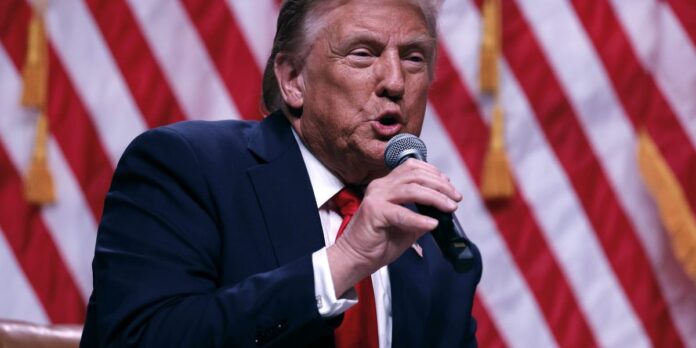Early on Wednesday, U.S. stock futures surged as results from the presidential election suggested a potential win for Donald Trump and Republican control of the Senate.
Both Republican and Democratic states have shifted towards Trump and Kamala Harris. Key swing states like Pennsylvania, North Carolina, and Georgia have been called for Trump, bringing him close to victory. Prediction markets are already indicating nearly 100% odds of a Trump win.
Stock futures for the Dow Jones Industrial Average rose by 956 points, or 2.2%, while the S&P 500 gained 1.9% and the Nasdaq increased by 1.7%.
The “Trump trade” rebounded after a slight setback in the previous days. The U.S. Dollar Index rose by 1.5%, the 10-year Treasury yield increased by 10 basis points to 4.38%, and Bitcoin surged by 6% to $73,730, briefly hitting $75,000.
These assets have been closely following Trump’s political prospects, as his policies are viewed as inflationary, limiting the Federal Reserve’s rate-cutting capabilities. Additionally, Trump has positioned himself as a supporter of the crypto sector.
Meanwhile, Trump Media and Technology shares surged by 10% in after-hours trading, while Tesla climbed by 3.5%. Solar stocks, on the other hand, fell as renewable energy initiatives face uncertainties.
Internationally, markets are watching the U.S. election closely due to potential global economic impacts, especially on trade. Trump’s proposed tariff increases, particularly on Chinese imports, are causing concern. In response, China’s Shanghai’s SSE Composite Index was down 0.1%, while Japan’s Nikkei 225 rose by 2.6%. In Europe, stocks showed modest gains.
Other races, including control of Congress, will also influence policy decisions in the future. Republicans have gained control of the Senate, while the results for the House remain uncertain. The Federal Reserve is expected to announce a 25 basis point rate cut at its policy meeting on Thursday.
Economic Outlook Under Trump and Harris
If Trump secures another term, investors anticipate fewer regulations, benefiting bank stocks, cryptocurrencies, and companies in the oil and gas sector. On the other hand, Harris is expected to continue many of Biden’s policies, supporting green energy initiatives and infrastructure projects.
Their differing tax policies will impact corporate earnings and personal income. Trump plans to extend tax cuts and reduce corporate tax rates further, while Harris aims to raise corporate taxes and implement taxes on unrealized capital gains.
Challenges Ahead for the Next President
Whoever wins the election will face challenges related to the soaring U.S. debt and deficits. Analysts have warned about the growing federal deficit under both Trump and Harris, with Trump’s policies expected to deepen the deficit even further.
“Bond vigilantes” may react to the increasing deficits by selling off bonds, leading to higher yields and borrowing costs. This could have significant implications for the economy, including mortgage rates.
Follow our comprehensive coverage of the U.S. election to stay informed about the outcomes and their impacts.




